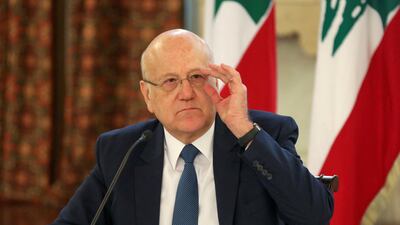Lebanon’s Prime Minister Najib Mikati said on Tuesday that central bank governor Riad Salameh should remain in position for now, signalling continued political backing for him despite embezzlement probes at home and abroad.
“One does not change their officers during a war,” Mr Mikati told a news conference in reference to Mr Salameh, adding that he would wait for the results of investigations that are being conducted by judicial authorities in Switzerland and elsewhere.
Mr Salameh has repeatedly denied any wrongdoing.
Mr Mikati, a billionaire tycoon, said the investigations into Mr Salameh were “being used in politics”.
Mr Salameh’s tenure as governor has come under increased scrutiny since 2019 when Lebanon collapsed into a financial meltdown that has sunk the currency by about 95 per cent and caused poverty to rocket.
The central banker, who oversaw the financial system for three decades, continues to enjoy political backing from other powerful players in Lebanon, notably parliament speaker Nabih Berri.
He is being investigated by authorities in at least four European countries. The probes include a Swiss inquiry over alleged “aggravated money laundering” at the central bank involving $300 million in gains by a company owned by his brother, Raja Salameh.
In November, Mr Salameh said he had ordered an audit of transactions and investments that had been the focus of media reports and this had shown no public funds were used to pay fees and commissions to the company owned by his brother. Raja Salameh has not publicly commented on the accusation.
Mr Mikati also called for a national dialogue on foreign policy and for improving ties with Gulf countries.
His government, which aims to restart talks with the International Monetary Fund to unlock much-needed foreign aid, has not met since October 12 due to a dispute over a probe into last year’s catastrophic Beirut port blast.
The prime minister said he would not call for a meeting that could lead the government to unravel.

